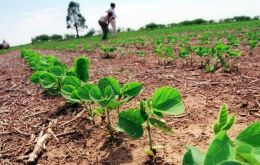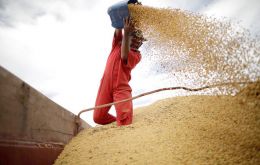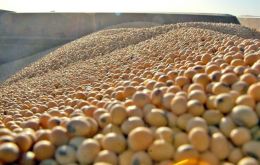MercoPress. South Atlantic News Agency
Tag: soybean
-
Tuesday, October 8th 2019 - 09:22 UTC
Dry spell blamed for the slowest 2019/2020 soybean planting season in Brazil

Brazilian farmers have planted 3.1% of the estimated soybean area for the 2019/2020 crop, agribusiness consultancy AgRural said on Monday, blaming a lack of rain for the slowest start to the season in six years.
-
Wednesday, September 25th 2019 - 09:04 UTC
Brazilian farmers face the challenge of African Swine Fever impact in China

Chinese commodities trader COFCO said it expects a sharp drop in the number of soybeans it will source for export from Brazil this year due to an outbreak of African Swine Fever (ASF) in China that has hurt demand for animal feed.
-
Friday, September 13th 2019 - 19:17 UTC
Brazil's soybean and corn sowing seasons delayed because of very dry conditions

Brazil’s soybean sowing season for the 2019-20 harvest is officially underway, but there might not be too many planters out in the fields just yet as conditions are extremely dry.
-
Friday, September 13th 2019 - 11:54 UTC
Chinese private firms return to buy some 600.000 tons of US soybeans

Privately run Chinese firms bought at least 10 boatloads of U.S. soybeans on Thursday, the country's most significant purchases since at least June, traders said, ahead of high-level talks next month aimed at ending a bilateral trade war that has lasted more than a year.
-
Thursday, September 5th 2019 - 09:45 UTC
Brazil soybean sales to China in August down 40% year on year

Brazil shipped 4.1 million tons of soybeans to China in August, down 40% year on year, according to the Secretariat of Foreign Trade of Brazil, or Secex. Though Secex didn’t provide any reason for the sharp drop, but trade sources cited rising competition from Argentina and African swine fever among the reasons for the decline.
-
Thursday, September 5th 2019 - 09:44 UTC
Argentine farmers changing from corn to soybeans to cut costs

Argentine farmers, anxious about an increasingly murky political outlook and economic turmoil, are turning toward soy over more expensive corn to cut costs, a shift that could impact next season’s harvest in one of the world’s top grain exporters.
-
Thursday, September 5th 2019 - 09:19 UTC
Soybean plantation in Brazil forecasted to grow at a much lower pace

The area in Brazil to be planted with soybeans in the 2019-20 season, which starts this month, will grow by the slowest pace in 13 years as a global trade war and swine fever in China cloud the outlook for farmers, according to analysts at AgRural.
-
Saturday, June 15th 2019 - 08:43 UTC
Good sales prospects from China for Argentina's 56 million tons of soybeans

The soybean harvest in Argentina for the 2018-19 crop year is almost complete, according to the Buenos Aires Grain Exchange. The forecast for total production was the second-highest in 19 years at 56 million mt, up 48% year on year due to a better than expected yield of 3.35 mt/hectare, BAGE said.
-
Wednesday, April 24th 2019 - 09:06 UTC
Brazilian soy farmers launch “awareness campaign” against Bayer's possible anticompetitive practices

A Brazilian grain growers association has launched a hot line to encourage farmers to report practices on the part of Germany’s Bayer SA that potentially could be anti-competitive, according to statement sent to Reuters on Tuesday.
-
Tuesday, April 23rd 2019 - 08:07 UTC
African swine fever in China: Brazil expects soy exports to fall but no ceiling for meat sales

Brazilian soy exports to China will definitely decline this year as African swine fever in the world’s No. 2 economy cuts demand for the animal feed, but potential growth in meat exports would offset this, Brazil’s agriculture minister said on Monday.
